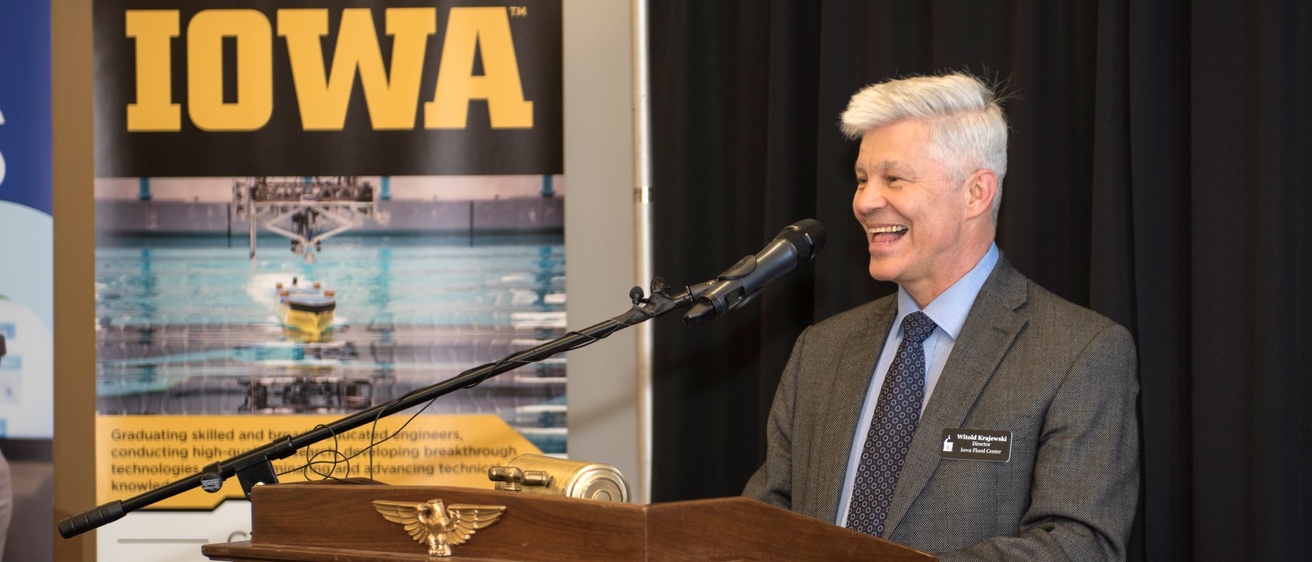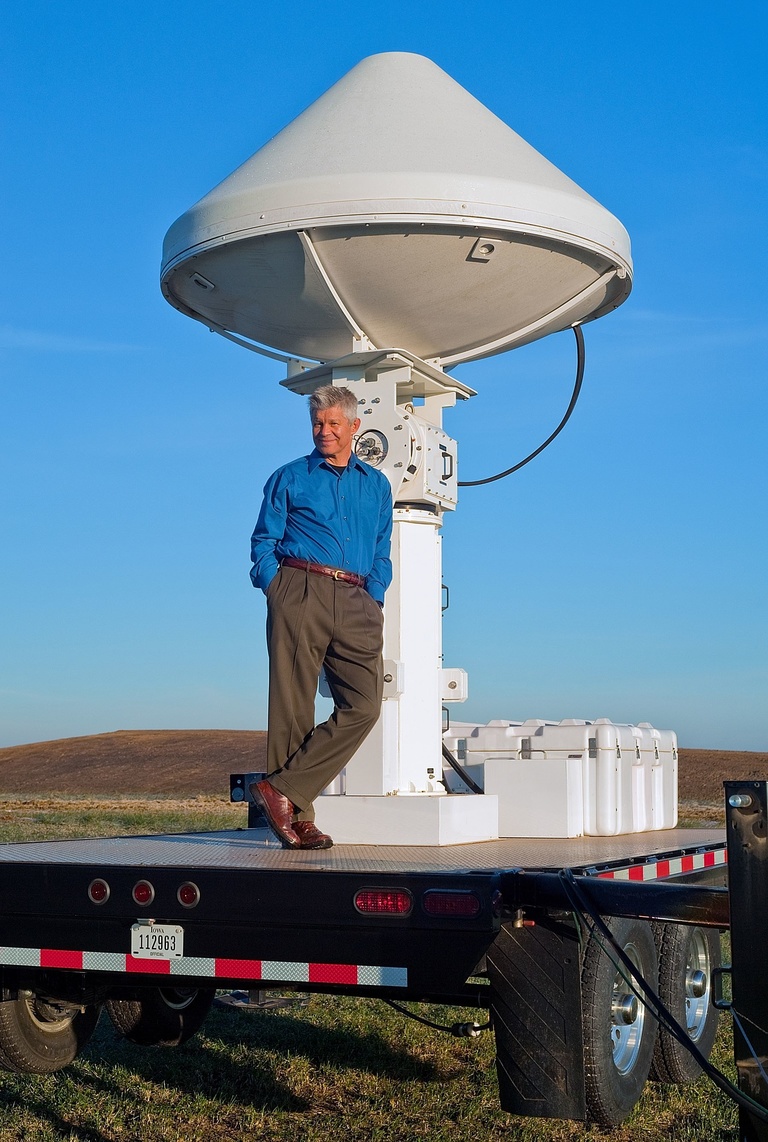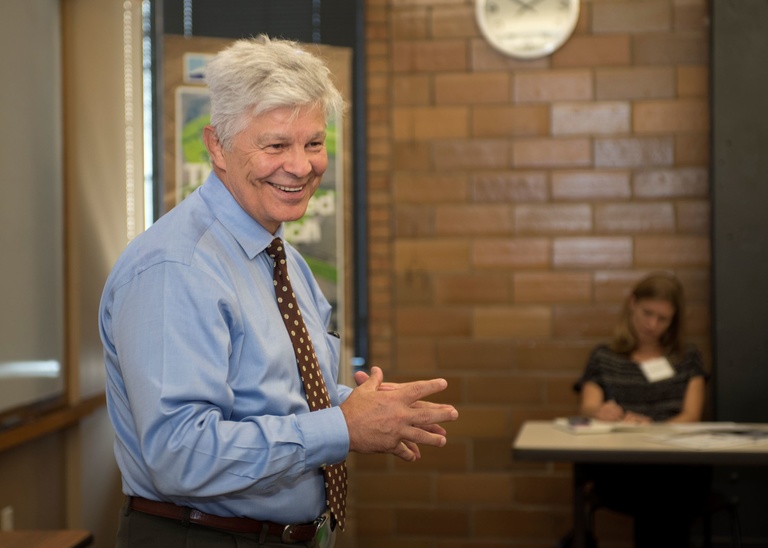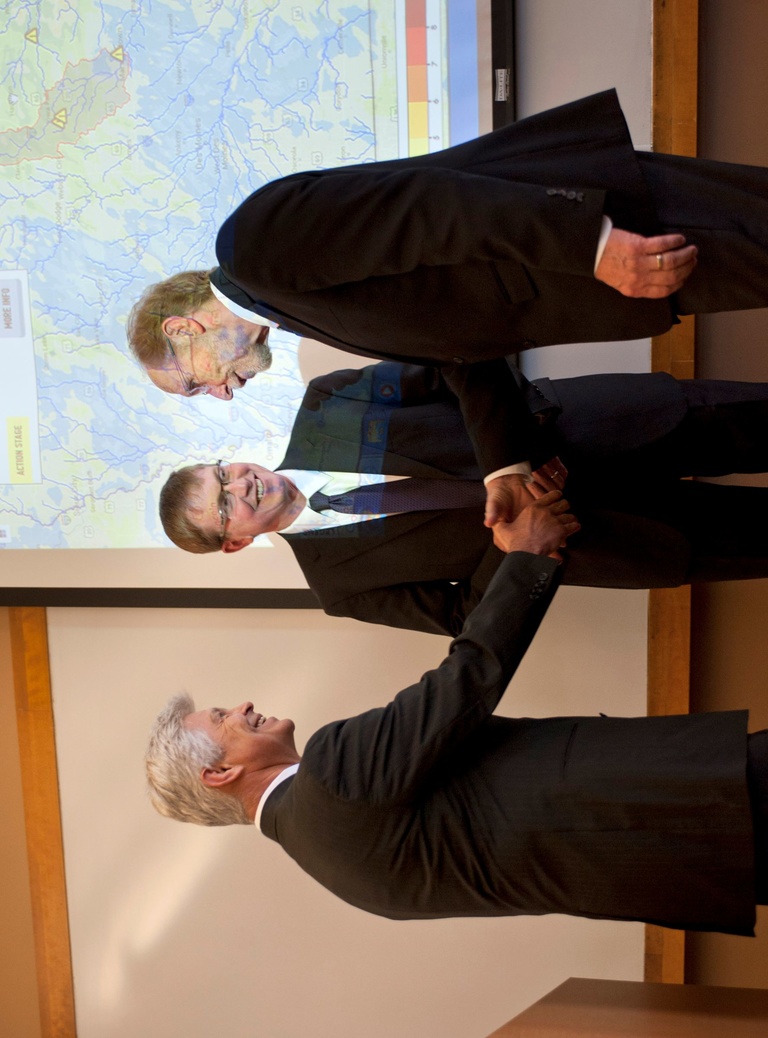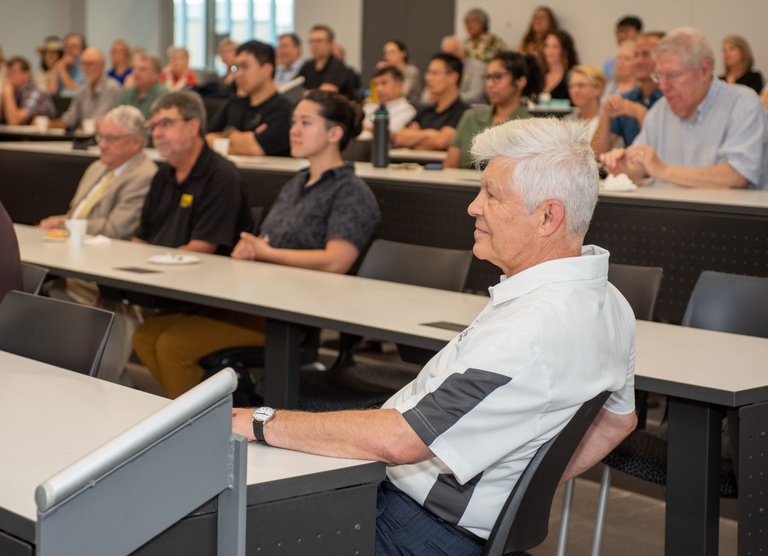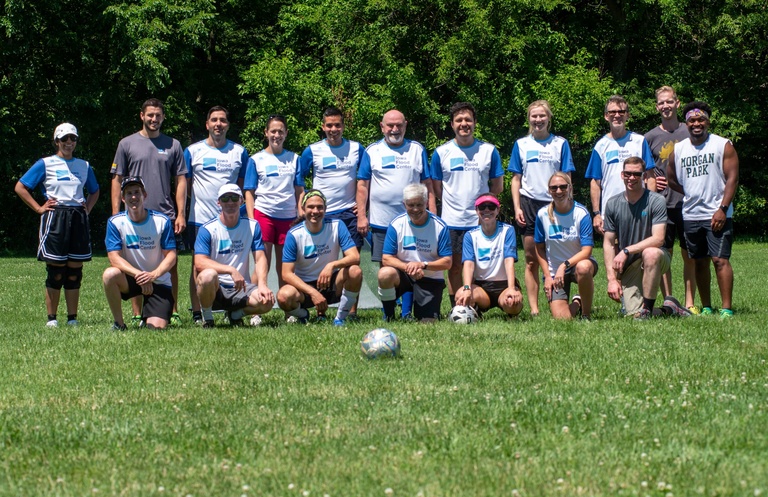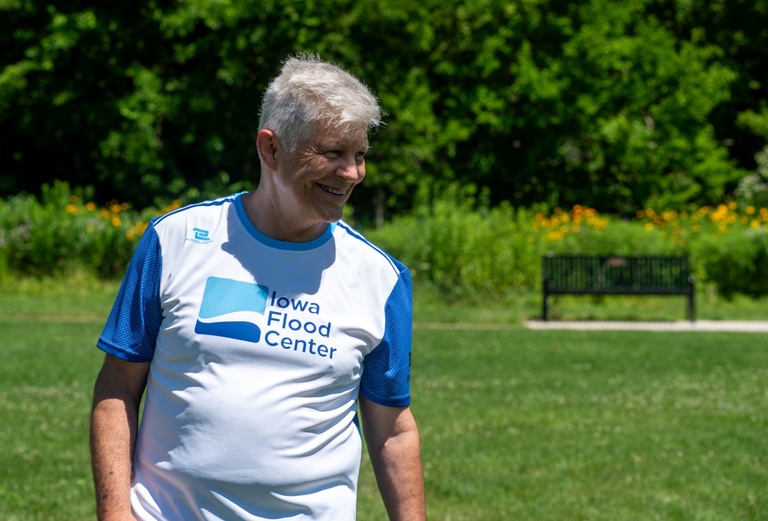Witold Krajewski reflects on a career that was 'something special'
When Witold Krajewski was a young man, he arrived in the United States from communist-controlled Poland with just two suitcases and $400 in his pocket — and a PhD in water resources systems engineering. He was about to begin a career that would earn him international recognition.
In that moment, though, it took a leap of faith. Remembering that young man, Krajewski admits that he was well prepared academically but lacking in one area — his ability to speak English.
He had studied English in school, but never had the opportunity to practice speaking it. “My comprehension was poor,” Krajewski says. “It was very frustrating.”
Finding his voice
Krajewski, who will soon retire as professor of civil and environmental engineering at the University of Iowa, has built an impressive career. He has served as director and co-founder of the Iowa Flood Center (IFC), the Rose and Joseph Summers Chair in Water Resources Engineering, research engineer at IIHR—Hydroscience and Engineering (IIHR), and more. He has mentored more than 50 master’s and PhD students. In 2021, Krajewski was elected to the National Academy of Engineering and named a fellow of the American Association for the Advancement of Science.
He credits his parents, both academics, for setting him on the path to success. His mother, Jadwiga, was a historian and director of the University of Warsaw Library. His father, Karol, was an engineer and a professor at the Warsaw University of Technology.
“They talked, and I listened,” Krajewski says. “To say that I couldn’t be here without them would be an understatement.”
That Polish magic
Krajewski’s first position in the United States was as a postdoc at Utah State University in Logan, Utah, a small college town close to hiking trails and skiing areas. “I loved everything about it,” Krajewski says.
After he spent a year in Utah, he accepted another postdoc position at the National Weather Service (NWS) in Silver Spring, Maryland, which eventually led to a federal appointment. He liked the job, which allowed him to explore his interests in hydrology and discover a fascination with radar remote sensing of rainfall. He participated in the early days of the NEXRAD system, a nationwide network of weather radars. The NWS, however, had another beautiful attraction.
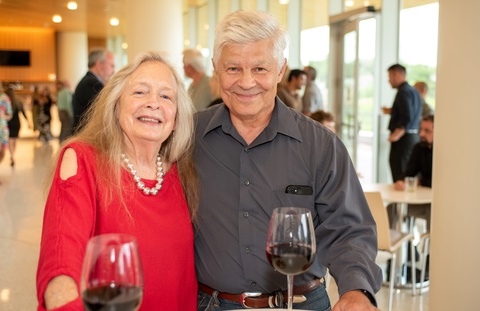
It was at the annual NWS holiday party that Krajewski first encountered the woman he would eventually marry. “I saw Diana standing with some friends,” he remembers. A colleague noticed Krajewski looking and said, “Witek, show me how you meet women in Poland.”
“So, I said, ‘Go get me a glass of wine and I’ll show you,’” Krajewski remembers. “The rest is history.”
It's great to be a Hawkeye
Witold and Diana Thrift married in 1984, and professional change was on the horizon as well. “I was happy at NWS, but I always wanted the freedom of academia,” he says. A friend at IIHR, Konstantine Georgakakos, encouraged Krajewski to apply for an open position there.
And so, in 1987, Krajewski applied for and won a job at the University of Iowa College of Engineering and IIHR, where he has continued his research in hydrology and water resources engineering.
“Once I got here, I could do what my curiosity pushed me to do,” he says. “Even though I studied rainfall, the motivation was always flooding and the prediction of flooding. When they established the Iowa Flood Center, I can say I was ready — really ready.”
He's no cowboy
Iowa held attractions for Diana as well. She earned a graduate degree at the University of Iowa’s prestigious Nonfiction Writing Program. Even before that, though, she had always been her husband’s best editor and communication advisor.
“She definitely had a big role in improving my writing,” Krajewski says.
Iowa also offered the space to keep horses — something Diana had always wanted to do. Krajewski was dubious. Despite his love for playing sports — especially judo, soccer, and basketball — Krajewski had little experience with horses. “I just hated it because it was dangerous, and I didn’t know anything about it,” he says.
In time, though, he became more comfortable with horses and riding (especially his own horse, Kasztan). Riding in the Snowy Mountains in Wyoming feels like being in a movie, Krajewski says.
“I learned everything from Diana.”
A new urgency
In 2008, a destructive flood engulfed much of eastern Iowa, including the University of Iowa campus. Krajewski remembers feeling helpless and frustrated.
“Even though I was doing relevant research on rainfall, we couldn’t help much,” he says.
But IIHR had impressive capabilities in fluids engineering and river-related research, and interest began to bubble up at the state capitol about doing something to make Iowa more flood resilient.
“They asked us, ‘What would you do if we asked you to share your expertise?’” Krajewski remembers. With IIHR Director Larry Weber, Krajewski drafted a two-page document that laid out a path forward. The Iowa Legislature went on to write a bill establishing the IFC that quoted the document almost word for word.
“They basically put us to work. They said, ‘Okay, enough of this ivory tower thinking. It’s time to do something,’” Krajewski says. “And we did. We are engineers, after all.” He adds, “I formulated the technical vision. Everybody got on board with that vision. And that’s why we could do what we did.”
No jargon
When Krajewski and Weber founded the IFC, Krajewski established one firm rule — no jargon.
“Because English is not my first language, this ability to communicate — that’s something I think about,” he says. “If you are saying something and you see a blank expression, well, then just say it again, in a different way.
“Jargon-free communication — that is fundamental.”
Serving Iowans
In the years since, the Iowa Flood Center has become a trusted source of science-based information for individuals, emergency managers, homeowners, business owners, farmers, and more. Through the online Iowa Flood Information System (IFIS), which is free to all, Iowans can learn about their flood risks and find information to help them stay safe from floods.
Iowa has become a model for the nation, attracting visitors from places such as Texas and North Carolina, eager to learn about what the IFC has achieved and how it can be applied in other places.
But in the beginning, the IFC had no example to follow. Weber and Krajewski created it as they went along, based on their own knowledge and experience and calling on IIHR colleagues for their expertise. This wasn’t just science for other scientists — this was for all Iowans. And “no jargon” was a central tenet.
“Nobody told us this, but by definition, the customer is everybody,” Krajewski says.
Part of the IFC mission was to present information in a way that was accessible and understandable to all.
Reliable flood information
The IFC’s achievements include the following:
- The design, manufacture, and deployment of almost 300 stream-stage sensors statewide, sending data to IFIS every 15 minutes and allowing Iowans to track water levels on rivers and streams near their homes and businesses to know when floods are imminent.
- Flood inundation maps for more than 30 flood-prone communities statewide, providing information about where predicted floodwaters will go and how deep the water will be. With this information, officials and individuals can respond to rising water quickly and appropriately.
- Statewide floodplain maps for all 99 counties showing the boundaries of common as well as rare floods for all Iowa streams.
- Model-based real-time streamflow forecasts for the entire state.
- A hydrologic monitoring network providing flood and drought information in more than 50 Iowa counties, working toward a goal of one station in each of Iowa’s 99 counties.
- IFIS, a highly innovative online information platform, offering easy access to the IFC’s flood-related information, visualizations, and applications. IFIS has had more than 4.5 million visits since its launch in 2011.
To let Iowans know about the IFC’s services, the center has also deployed an impressive communication and outreach program that includes an annual legislative breakfast for lawmakers in Des Moines to communicate the ways the IFC is making a difference for Iowans.
A strong purpose
As co-founder and director of the IFC, Krajewski has provided the all-important vision, leadership, and motivation behind the center’s success. But he is quick to say it is not a one-man show.
“All this work wouldn’t be possible without a major effort by many people, now and over many years,” Krajewski says. Students, faculty, staff, and agency personnel have all played important roles in the center’s success.
When Krajewski finished his term as IFC director in June, he and Diana (with the horses) moved to Reno, Nevada, to be near their daughters Joanna and Sophie and their grandchildren.
But even when he has stepped down as director of the Iowa Flood Center, Krajewski will continue his involvement on a part-time basis, focusing on research and returning to Iowa a few times a year.
“There was life before the Iowa Flood Center,” Krajewski says. “But then the flood came and that changed my life. It just gave me such a strong purpose.”
He adds, “We did something special. And also, I know that I was the driving force for that. It was my vision, but also the ability to bring people together to contribute their skills and energy.
“I’m happy about that because I know it was special,” he says. “It still is special.”
Witold Krajewski: mentor, colleague, coach, and friend
“On my graduation day, Witek called me his ‘engineer daughter.’ I share the feeling. Witek is my engineer father, and he taught me a way of living, with respect, love, kindness, balance, ethics, and great sarcastic humor. I will forever be honored and grateful for having Witek in my life.”
LUCIANA KINDL DA CUNHA, PHD AND FORMER ADVISEE
“His mentorship was a key factor in my professional development, fostering in me the skills and confidence to become an independent researcher. Witek’s career, undoubtedly legendary and far-reaching, will leave a lasting impact for generations to come, and I am grateful that our paths intersected.”
MOHAMED ELSAADANI, PHD AND FORMER ADVISEE
“I could write paragraphs about the impact Witek and his vision for the Iowa Flood Center has had on Bremer County. From immediate flood inundation mapping during an event to mitigation efforts following (or before the next), Witek and the IFC have preserved/protected untold thousands of dollars in damages, and more importantly — lives have been negatively impacted minimally or not at all, rather than completely upended. Thank you for your inspiration, Witek! You and your team have made countless differences.”
KIP LADAGE, BREMER COUNTY EMERGENCY MANAGER
“I would be remiss not to mention the true honor it is to be in partnership with the Iowa Flood Center and what it’s meant to the whole state of Iowa. To have the expertise and resources available to us as emergency managers, helping us plan for the best possible practices in all our preparedness efforts, is priceless. The partnership and friendship with Witek and his team is forever appreciated and has made our work better. Witek and the IFC truly support the populations we represent.”
RICK WULFEKUHLE, BUCHANAN COUNTY EMERGENCY MANAGER
“What makes Witek so unusual is that he can translate the theory into a practical, working system that benefits society. IFC is a great example of this … I think of the Iowa Flood Center and IFIS as a moonshot of sorts. Some of the pieces were lying around but it takes a very unique individual with vision, drive, focus, and multi-faceted skill to make everything work together.”
ANTON KRUGER, DONALD E. BENTLY FACULTY FELLOW OF ENGINEERING AND IFC RESEARCHER
“Witek’s demeanor and interactions with students and colleagues remind me of those great legendary coaches of a sports dynasty. He can bring a team together with his vision and energy. But he also recognizes that every individual has a role in the team’s success. He sets high standards for himself and others. And he encourages everyone to achieve at their highest level, which is often so much more than they originally thought was even possible.”
ALLEN BRADLEY, UI PROFESSOR OF CIVIL AND ENVIRONMENTAL ENGINEERING AND IFC RESEARCHER
